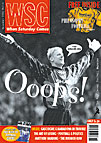 Filippo Ricci looks at the connections between Italian politics and football
Filippo Ricci looks at the connections between Italian politics and football
From Benito Mussolini, who even wanted the national team to play in black shirts, to Silvio Berlusconi, politics and football in Italy have walked together. Until the eighties Roma had just won one title, in 1941-42, the season since known as “Mussolini’s championship”. The Duce simply decided that the title must come to the capital and so it came.
Berlusconi seems at times to have exerted a comparable influence. After buying Milan in the eighties, Berlusconi gave his assistant Fedele Confalonieri (the man who played piano while Berlusconi sang on cruise ships many years before) the task of finding a new coach for the team when he bought Milan. Confalonieri recommended Osvaldo Bagnoli, the coach who had led Verona to their first-ever league title in1985, only to be told by his boss, “No, I don’t want to put my team in the hands of a communist.” Bagnoli, from a working class Communist-supporting family in the Milan suburbs, brushed aside his disappointment, and Arrigo Sacchi came instead.
Berlusconi seems to have broadened his mind a bit in the intervening years because this summer he signed as Milan coach Oscar Washington Tabarez, a Uruguayan who has never hidden his support for the left, in Italy and Uruguay, where he has appeared, along with international striker Ruben Sosa, in electoral posters for the leftist Frente Amplio.
In 1993 Berlusconi decided to enter politics “to save the country from communism”. He owed most of his popularity to football, so he planned to ride the wave: lifting the most popular terrace chant for the national team, Forza Italia, as his party name, taking blue as his party’s official colour and calling his candidates ‘Azzurri’. When announcing his candidature for the first time, he spoke like a TV football commentator, using all the most common football expressions. His first sentence, “I decided to enter the field . . .”, became a national catchphrase.
On 27th March 1994, Forza Italia won the elections. The Sunday before, asked to comment on the match just played by his team, Milan striker Daniele Massaro replied with advice about how the nation should vote, talking about the “fear of communism”. On the same day during Pressing, the weekly football programme broadcast on Italia 1, one of Berlusconi’s three channels, the presenter Raimondo Vianello, a former actor never involved with politics, also spoke about “our president” and his good works.
The Milan supporters’ favourite former player is Gianni Rivera. Rivera has been a member of the Italian parliament for many years, elected first as a Christian Democrat then after that party’s collapse moving with it’s liberation into the left coalition which won the last elections. Much to Berlusconi’s frustration, and to Rivera’s credit, the Milan president has never been able to persuade Rivera to in any way endorse the club’s current administration.
Since the start of the Berlusconi period, no current Milan player has stepped out of line, though some have leaned further right, notably goalkeeper Filippo Galli who declared his admiration for Gianfranco Fini, leader of the fascist Alleanza Nazionale.
Historically, Lazio had always been seen as the ‘fascist team’. Their public image these days is a little different, but Daniela Fini, Gianfranco’s wife, is always at their home games. Her husband’s favourites, however, are Bologna, from his home city. After many years Bologna are back in Serie A, so now it’s appropriate for Fini to be seen at their home games.
Bologna is one of the ‘reddest’ cities in Italy, however, and the team’s coach, Renzo Ulivieri, who openly supports the left government, never misses a chance to trade opinions with Fini. During the last election campaign when Fini talked of Uliveri not being capable of leading Bologna to promotion, Uliveiri remarked that Fini was not a decent enough person to run the country.
From WSC 118 December 1996. What was happening this month